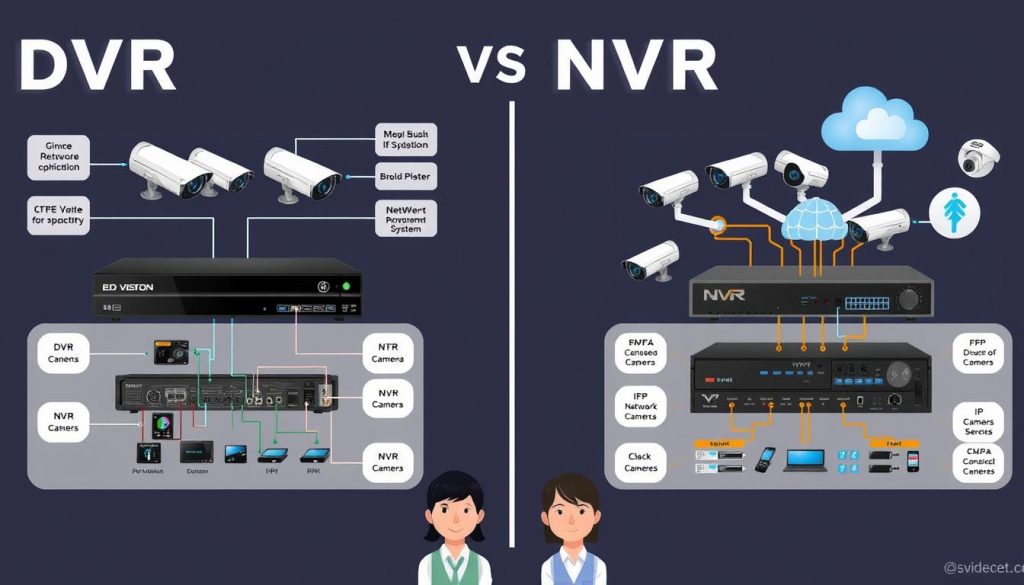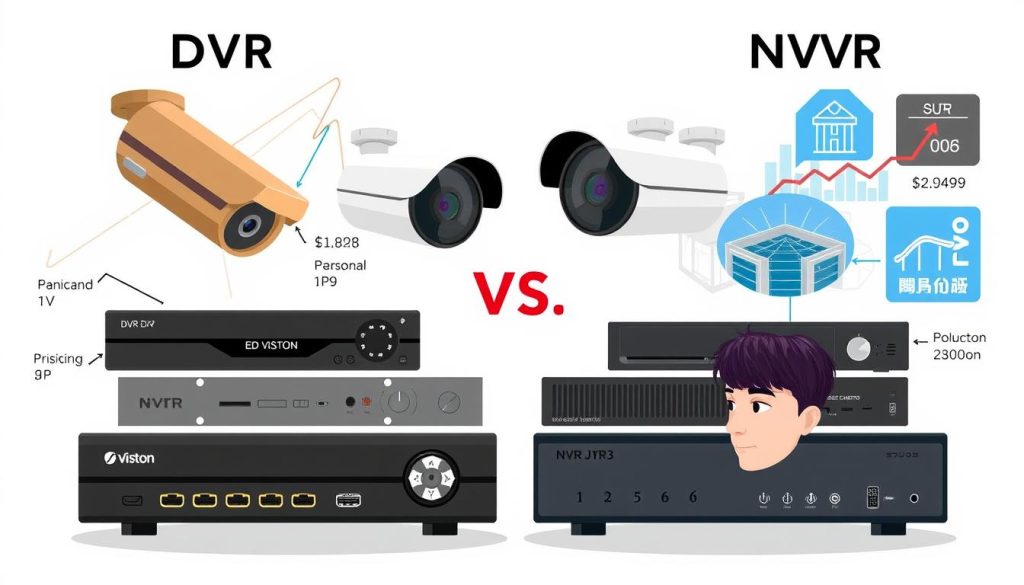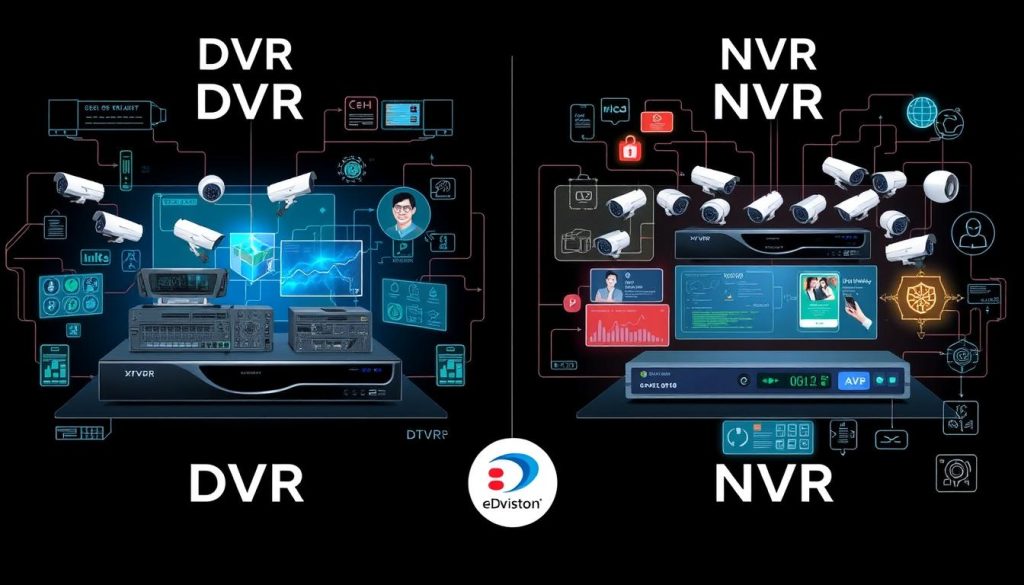Video surveillance is key in today’s world. Many wonder: Is choosing between DVR and NVR just about money, or does it affect your security? Knowing the differences between Digital Video Recorders (DVR) and Network Video Recorders (NVR) is important. This article will help you understand these differences to make a better choice.
We will look at important points like storage, video quality, setup ease, and cost. These are key for users in Singapore. By the end, you’ll know the main differences and which system fits your security needs best. For the latest CCTV solutions and offers, contact ED Viston today at +65 8313 4578.
Key Takeaways
- DVR systems are budget-friendly but limited in resolution and scalability.
- NVR systems support higher resolutions and allow for greater flexibility and camera handling.
- Understanding the differences in installation complexity can guide your choice for home or business needs.
- Choose NVR for advanced features like audio integration and remote access capabilities.
- Scalability is a key differentiator; NVRs can grow with your security requirements over time.
Understanding DVR and NVR Technology
Security technology has many options, but DVR and NVR systems often confuse people. To know what is the difference between DVR and NVR?, we need to look at how they handle video. DVR systems take analog video and turn it digital. NVR systems, on the other hand, deal with digital video right from the camera.
DVR systems use coaxial cables to connect with analog cameras. These cables can go up to 500 meters. But, images can get fuzzy after 300 feet (90 meters). NVR systems use Ethernet cables with IP cameras, going up to 328 feet (100 meters). They also have Power over Ethernet (PoE) for a single cable solution, making installations cleaner.
Another key difference is in sound recording. DVR systems have limited audio support, mainly for a few cameras. NVR systems, though, let all connected cameras send audio, making sound and video recording easier. The gap in resolution between these systems has narrowed in the last five years, affecting market choices.
If you want to learn more about CCTV technology, call ED Viston today at +65 8313 4578. They can tell you about the newest CCTV solutions and deals.
DVR vs NVR: How They Process Video Data
Video surveillance technology has two main types: DVR and NVR. Each has its own way of handling video data. Knowing these differences is key to picking the best system for you.
DVR systems change analog signals into digital ones at the recorder. This can limit video quality and what the system can do. DVRs can offer good video resolution but not as high as NVRs. Analog cameras use coaxial cables, which can go up to 1,000 feet without losing signal.
NVR systems, on the other hand, process data at the camera level before storing it. This makes NVRs better at showing clear images, from 2MP to 12MP or more. Ethernet cables help keep the signal strong, up to 1,000 feet.
- NVRs often include integrated audio recording capabilities, which are rarely found in DVR systems.
- They support higher video resolutions, often reaching 4K, making them ideal for detailed surveillance.
- The scalability of NVR technology surpasses that of DVRs, allowing for the seamless addition of IP cameras to a system.
- Remote access over the Internet enhances the management of NVR systems, providing flexibility not commonly associated with DVR setups.
NVRs might cost more upfront because of their advanced features. But they offer more storage options. This is because they use network-based storage, unlike DVRs’ hard disks.
When deciding between DVR and NVR, think about what you need for your surveillance. For more info on surveillance solutions, call ED Viston at +65 8313 4578. They can help you find the best CCTV options in Singapore.
What is the difference between DVR and NVR?
DVR and NVR systems are key in choosing the right surveillance for your needs. Each has its own way of processing and storing video. This affects the video quality, how easy it is to install, and how well it works.
Analog vs Digital Footage
DVR systems handle analog footage, which can have lower quality than NVR systems. NVRs, on the other hand, use digital IP cameras. They can offer high-definition footage up to 5MP or 4K.
This big difference is a key factor when deciding between DVR and NVR.
Data Processing Locations
DVRs process data right at the recorder. NVRs do encoding and processing at the IP camera level. Then, they send the video for storage.
This setup supports higher FPS and better image quality. Knowing these differences helps a lot in the DVR vs NVR debate.
For those looking for top-notch surveillance, NVR systems are often the better choice. They offer better image quality and more flexibility in installation. DVR systems, on the other hand, are cost-effective and stable. They’re good for those with less bandwidth needs.
Think about what you need carefully. For the latest CCTV solutions and offers, contact ED Viston today at +65 8313 for more information.
DVR System Components
DVR systems have key parts that make them work well. Knowing about these parts helps you choose the right security system. Here are two main parts of a DVR system.
Analog Cameras and Coaxial Cables
Analog cameras are at the core of many DVR systems. They use coaxial cables to send video signals. These cables can carry signals up to 90 meters (about 300 feet) before video quality drops.
Coaxial cables are strong and cheap but limit where cameras can go. NVR systems use thinner Ethernet cables. They don’t have a length limit, making it easier to place cameras.
AD Encoders and Limitations
DVR systems use AD encoders to turn analog signals into digital. This makes the system more complex. It also affects how well the system can handle video data.
DVRs often struggle with high-resolution video. This can make video quality lower than newer systems. Knowing these limits is key when thinking about using a DVR system.

For more info on CCTV solutions and deals, call ED Viston at +65 8313 4578.
NVR System Components
Understanding NVR system components is key for better surveillance. These systems use modern tech for top-notch features, unlike old DVRs. Important parts include IP cameras, Ethernet connections, audio support, and storage.
IP Cameras and Ethernet Connections
NVR systems mainly use IP cameras for better data handling. They differ from DVRs, which use analog cameras. NVRs connect via Ethernet, reaching 100 meters without extra switches.
Power over Ethernet (PoE) makes cabling easier. It sends power and data in one cable, simplifying setup.
Integrated Audio Support and Storage Capacity
NVR systems handle video and audio well. This integrated audio support boosts situational awareness. It makes security strategies better.
Storage is another NVR strength, with options like cloud storage. This flexibility and data protection meet today’s surveillance needs. These features show why NVR is often the better choice.
For more on CCTV solutions and offers, call ED Viston at +65 8313 4578.
DVR vs NVR Comparison: Key Features
It’s important to know the main features of DVR and NVR systems. This helps in choosing the right video surveillance. The main differences are in video quality and how easy they are to install.
Video Quality and Resolution
NVR systems offer better image quality. They can handle high resolutions like 5MP or 4K. This means clearer images. On the other hand, DVR systems might not be as clear because they use lower resolutions.
This makes NVR systems better for places where you need to see details clearly.
Installation and Scalability
Setting up DVR and NVR systems is different. NVR systems are easier to install because they use one cable. This makes it simpler to place cameras anywhere you want.
DVR systems need more cables and can only go up to 100ft. NVR systems can be wired or wireless. This makes it easy to grow your surveillance system.
For more info on CCTV solutions and offers, call ED Viston at +65 8313 4578.
DVR vs NVR Storage Options
Choosing a video surveillance system means understanding DVR and NVR storage. Both have their own benefits and challenges. Knowing the difference helps users pick the right system for their needs.
Local vs Cloud Storage
DVR systems use local hard disks, which can hold less footage. This can be a problem for those needing to keep video for a long time. NVR systems, on the other hand, can use cloud storage. This makes it easier to access footage from anywhere and adds features like AI and motion detection.
Storage Capacity Trends
Technology keeps improving, and so does storage capacity in DVR and NVR systems. NVR systems can handle higher resolution cameras, from 2MP to 12MP and more. This means they can store more video over time. DVR systems, made for analog cameras, can’t keep up with the latest resolutions. The trend is towards more flexible storage as people want better video quality.
| Feature | DVR Storage | NVR Storage |
|---|---|---|
| Type of Storage | Local hard disk only | Cloud and local storage options |
| Image Quality | Lower resolution (analog quality) | Higher resolution (up to 4K) |
| Flexibility | Limited to installed hardware | Highly adaptable with cloud options |
| Scalability | More difficult to scale | Easily scalable with IP cameras |
| Setup Complexity | Relatively simple | Potentially complex, network may be needed |
Understanding DVR vs NVR capacity is key. Each has its own strengths for different needs. For more information on CCTV solutions, call ED Viston at +65 8313 4578.
DVR vs NVR: Cost Considerations
Choosing between DVR and NVR systems means looking at costs. Costs are key for businesses and homeowners wanting affordable security. We’ll look at initial costs, long-term savings, and maintenance expenses.
Upfront Costs and Long-Term Savings
DVRs are often cheaper at first, making them appealing for small setups. They’re easy to start with. NVRs, on the other hand, cost more upfront. But they offer better video quality and more features, making them a good long-term choice.
Maintenance and Management Costs
When comparing DVR vs NVR maintenance, total cost matters. DVRs can cost more over time, mainly for upgrades. NVRs are easier to maintain, saving money in the long run. They improve network efficiency and offer cloud storage, reducing hardware costs.
| Aspect | DVR Systems | NVR Systems |
|---|---|---|
| Initial Costs | Generally lower | Typically higher (includes IP cameras) |
| Video Quality | Lower resolution | Superior quality due to IP technology |
| Scalability | Limited | Highly scalable |
| Maintenance Costs | Potentially higher due to upgrades | Lower with efficient management options |
Choosing the right system depends on these financial points. For more insight, contact ED Viston at +65 8313 4578. They offer the latest CCTV solutions and special deals.

Conclusion
In this DVR vs NVR recap, we looked at the main differences between these surveillance systems. DVRs are affordable and easy to set up with analog cameras. But, they have limits in image quality, distance, and features.
NVR systems, on the other hand, offer better image quality and support advanced features like AI and cloud storage. They are a better choice for today’s security needs.
Before choosing a surveillance system, think about what you need. Do you want something affordable and simple, or advanced and flexible? Both DVR and NVR have their benefits. Consider how easy it is to install and if it can grow with your needs.
For expert advice and to find the best CCTV solutions, contact ED Viston at +65 8313 4578 today. Make sure you understand your options and protect your property with the right technology.
FAQ
What is the main difference between DVR and NVR systems?
Which technology provides better video resolution?
How does the installation process differ for DVR and NVR systems?
What are the storage options available for DVR and NVR systems?
Are there any compatibility issues between DVRs and IP cameras?
Which system is more cost-effective in the long term?
Can I use audio features with DVR systems?
Source Links
- https://www.versitron.com/blogs/post/nvr-or-dvr-which-video-surveillance-system-is-right-for-you?srsltid=AfmBOoqBppCayk1EbFRsTC9sQB4NH6M1O8Bnqk1GEpXE7eBEXbgdeQxf
- https://www.coram.ai/post/dvr-vs-nvr-key-difference
- https://www.nordencommunication.com/en/blog/difference-between-nvr-and-dvr-systems
- https://info.verkada.com/compare/dvr-vs-nvr/
- https://blog.swann.com/dvr-vs-nvr-whats-the-difference/
- https://mammothsecurity.com/blog/nvr-vs-dvr
- https://www.versitron.com/blogs/post/nvr-or-dvr-which-video-surveillance-system-is-right-for-you?srsltid=AfmBOoqucqUS4Uaxy4kjp_mf4zT18tEDngxU1e-1j2HuSmH6e5L8gJAf
- https://www.versitron.com/blogs/post/nvr-or-dvr-which-video-surveillance-system-is-right-for-you?srsltid=AfmBOop11huo7hZbZ8aTCYH3AQ487RXPlmumvbXO57bbLX7u8L3RKjuc
- https://nellyssecurity.com/blogs/articles/whats-the-difference-between-an-nvr-and-a-dvr?srsltid=AfmBOoo_1zIFHCLMyaeMHFxZvuZGW2OHbcrPHG1PIZrydaFlii7ny_be
- https://solink.com/resources/dvr-vs-nvr-which-is-better/
- https://www.pelco.com/blog/nvr-dvr-guide
- https://www.avigilon.com/blog/nvr-vs-dvr
- https://www.indigovision.com/wp-content/uploads/DVR-or-NVR.pdf
- https://blog.zositech.com/whats-the-difference-between-nvr-and-dvr/
- https://reolink.com/blog/dvr-vs-nvr-which-one-is-better/?srsltid=AfmBOopfh_So5mvZxv7w52cQHmsO-VLFlMAaoV6zu1MSH-FV65ZYmy79
- https://nellyssecurity.com/blogs/articles/whats-the-difference-between-an-nvr-and-a-dvr?srsltid=AfmBOop0j5YEm3CNkCvCfwkRI6O0nmnFRjMZLq_m7rbeuqK5VP1KrMmu
- https://reolink.com/blog/dvr-vs-nvr-which-one-is-better/?srsltid=AfmBOoq8mZ4OqToUZzJG-o_aS57_8whYjVIFUOXuJ8PsYQZNsGE6CEjP
- https://www.westerndigital.com/en-in/solutions/cctv/blog/dvr-vs-nvr-video-storage-device-technologies
- https://www.dtiq.com/resources/dvr-vs-nvr-whats-the-difference-and-what-do-i-need
- https://www.spot.ai/articles/nvr-vs-dvr
- https://www.a1securitycameras.com/blog/which-is-better-nvr-or-dvr/?srsltid=AfmBOoogaZP9ZP14_qVb3vWleVk7LnTyg9DItV1da3zyZ-JvdyUQ7PKI
- https://reolink.com/blog/dvr-vs-nvr-which-one-is-better/?srsltid=AfmBOopkggNiQj-Qn9uUOpiLAsAgh7NT5IeMpiFGqORhNHhcQ_bSxZuB
- https://alfred.camera/blog/dvr-vs-nvr/

